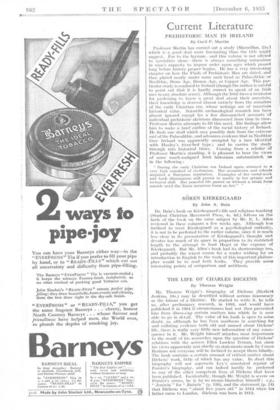Current Literature
PREHISTORIC MAN IN IRELAND
by Cecil P. Martin . . Professor Martin has carried out a • study (Macmillan, 210.)
which is a good deal more fascinating than the title might suggest. For to the layman—and this Volume is not offered to specialists alone—there is always something miraculdus in man's capacity to impose order upon ages which passed long before history proper begins. He has a very interesting chapter on how the Finds of Prehistoric Man are dated, and thus placed neatly under Some 'such 'head' as Palaeolithic 'or Neolithic, Stone Age, Bronze Age, or Copper Age. This par- ticular study is confined to Ireland (though the author is careful to point out that it is hardly correct to speak of an Irish race in any absolute sense): Although the'Irish have a weakness for professing to know a great deal about their ancestors, their knowledge is derived almost entirely from the annalists of the early' Christian era, ,whose writings are of uncertain historical value. Scientific archaeological research has been alMost ignored except for a few disconnected accounts pf individual prehistoric skeletons discovered from time to time. Professor Martin attempts to fill this need. His findings alloiv hini to make a brief outline of the racial history of Ireland. He finds one skull which may possibly date from the extreme end of the Palaeolithic, and advances evidence that in Neolithic time Ireland was apparently occupied by a race identiCal with Huxley's river-bed type ; and he carries the " study through into historical times. Coming from a scholar' of Professor Martin's standing, it is pleasant to hear the .views of some much-maligned Irish histerians substantiated, "as in the following : " During the early Christian era Ireland again attained to very high standard of civilisation. Her monasteries and schools acquired a European reputation. Examples of her metal-win'k and book illumination still persist to testify to her artistic and technical skill. Her peaceful life passed on without a break from outside until the Norse invasions btirst on her." •












































 Previous page
Previous page